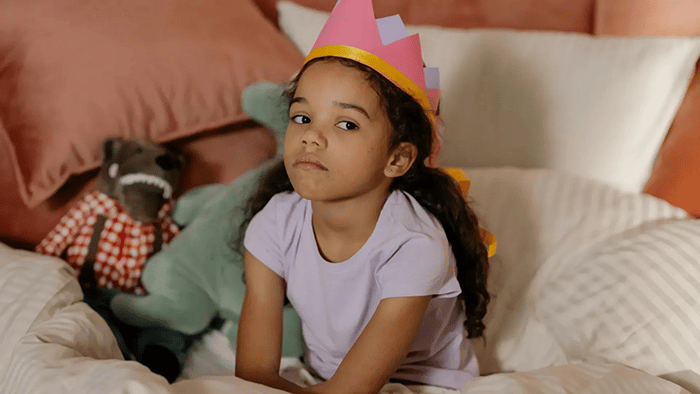- The Problem
- The Impact
- Encourage Your Child To Stay Original
- Encourage Your Child To Be Bold
- Help Them With Acceptance
- Guide Them At Their Own Pace
- Tell Them It's OkayTo Miss Out
Introduction
Childhood is crucial for socialization, but as children grow competent, the looming competition and peer pressure in this harsh hustle environment takes over. Here are a few ways to bring down peer pressure and child anxiety while understanding these aspects and impact better. Today's world has gone to the point where the competition level is seen as the level of self-respect and self-worth. Unrealistic standards have become trends that influence children with negative mental health, making them feel insecure about themselves. Parents are responsible for guiding the child towards the actual meaning of life, discussing how to handle peer pressure and child anxiety. Keep on reading.
The Impact Of Peer Pressure On Child Anxiety and How to Address It

Parents should know about peer pressure and its impact on child anxiety, along with how to address it better. Read along in these three parts to get a clear picture.
The Problem
The problem of comparing and constantly weighing over others' expectations and standards has made peer pressure a significant concern for the younger generation. Peer pressure means an individual must do what their friends are doing because everyone around them is doing the same thing. It is essential to know that peer pressure is nothing but a validation to participate in a rat race.
Peer pressure hides originality and pressurizes children towards stress and anxiety. This problem has created a cycle through various mediums, such as social media, societal expectations, and others, pushing the generation toward constant despair. Read along for the impact peer pressure causes, their effects, and how they can be addressed.
The Impact

Peer pressure puts significant stress on the mind, which pushes the children towards a state of anxiety, which, when prolonged, can turn into depression and other behavioral disorders and trauma. Here are a few pointers to look out how peer pressure impacts child anxiety.
● The fear of being left out or of missing out constantly drives the kids towards the vicious cycle of peer pressure.
● When children fail to surpass their friends' expectations, they are pushed more toward insecurity, inferiority, and stress.
● When this happens regularly, that child becomes underconfident and timid in their actions, resorting to pleasing people and isolation.
● Social isolation can cause loneliness and extreme behavioral problems, along with severe depression.
The Solution: How To Address Peer Pressure
Here are a few techniques to address peer pressure and maintain your child's mental well-being.
Encourage Your Child To Stay Original

Help your children understand that staying original is okay, as no one will judge them as they grow up. Everyone is trying to survive, and there are millions of faces. Children need to be unique to be in the spotlight. Following a rat race or getting into the pear pressure will help them nowhere. Make your kids understand that originality is initially missing in today's world. It is important to embrace one's original self.
Encourage Your Child To Be Bold
Encourage your child to be bold and explore various perspectives, choosing what's right for them to avoid the peer pressure of confusion. Most children don't know what's right and what's wrong, which forces them to follow their friends blindly. This phenomenon creates peer pressure even when the child doesn't feel it, or parents notice it. It is essential to encourage your child to be bold enough to explore and confident enough to stand by their opinion and present their perspective to everyone.
Help Them With Acceptance
Parents should also guide their children towards acceptance, so that no matter what, children will not be judged and help them accept themselves. Acceptance is a gift that helps children embrace themselves. It helps children overcome guilt or unrealistic expectations by embracing who they are.
Guide Them At Their Own Pace
Parents need to guide children at their own pace, so they are not too busy or in self-doubt finding themselves. This phenomenon will create more pressure on children than peer pressure if they are forced too far. Help and guide your child to their pace so they are happy about exploring themselves without any fear to avoid anxiety.
Tell Them It's OkayTo Miss Out
Make your kids realize that it is okay to miss out and help them learn the concept of JOMO. The joy of missing out advocates originality and uniqueness over the fear of missing out, where kids can be more confident with their self-worth with increased self-esteem.
Conclusion
Now that you know how peer pressure impacts child anxiety and how it can be addressed with different techniques to help the child, make sure you are protecting and guiding your child towards better mental well-being.
Smriti is a content writer who creates clear, practical, and informative content backed by science and relevant data. With a strong understanding of structured writing, she breaks down complex topics into simple, actionable insights. Her work is focused on helping readers prepare, learn, and grow with confidence and clarity.
The views expressed are that of the expert alone.
The information provided in this content is for informational purposes only and should not be considered a substitute for professional medical advice, diagnosis, or treatment. Always seek the advice of your physician or another qualified healthcare provider before making any significant changes to your diet, exercise, or medication routines.
References
https://www.parents.com/how-peer-pressure-affects-children-8619289
















